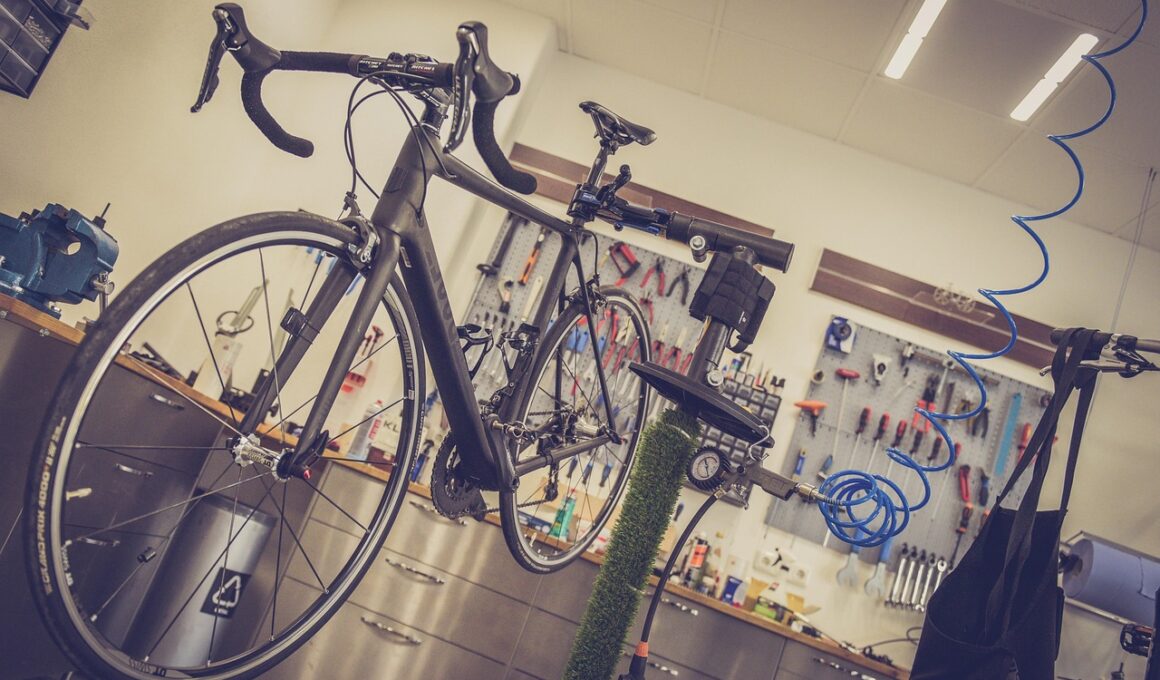Quick Fixes for Common Mechanical Problems During a Triathlon
Triathletes often face mechanical issues during races, which can significantly affect performance. Therefore, understanding quick fixes for these common problems is crucial. First, let’s discuss flat tires, a frequent and unfortunate occurrence. Carrying a spare inner tube and tire levers can make it easier to replace a flat tire on the go. Make sure to practice changing a tire at home to build confidence. Additionally, use a multi-tool for quick adjustments on the bike. Keeping these items in an accessible pouch can save precious time during the race. An alternative is carrying self-sealing tubes, which can be a lifesaver if you’re not comfortable changing tires mid-race. Furthermore, knowing how to properly inflate your tires pre-race can prevent issues during the competition. Under-inflated or over-inflated tires lead to decreased performance; thus, gauge your tire pressure before starting. It’s advantageous to familiarize yourself with your bike’s specifications ahead of race day for optimal performance. Finally, don’t forget to double-check your brakes. Making adjustments here can lead to enhanced safety and better stopping power throughout the triathlon.
Addressing Brake Issues
Another common mechanical problem in triathlon racing is brake issues. Your stopping power can dramatically change how you navigate descents or tight corners during the race. It’s crucial to regularly inspect your brakes to ensure their functionality. Start by checking brake pads for wear. If they are worn down, they should be replaced before race day. Squeaky brakes may indicate that they need adjustment or cleaning. To ensure that they function well, adjust the alignment. The pads should touch the rim evenly to facilitate optimal braking performance. Moreover, take a moment to examine brake cables for fraying or damage. A broken cable can lead to a complete brake failure during the race, posing significant safety risks. If there’s any sign of wear, replace cables immediately. Additionally, during the triathlon, if you feel your brakes are not responsive, it might be worth pulling over to make minor adjustments. Having a simple setup at the bike transition area, like new brake pads or tools, can make all the difference. Always prioritize safety to improve your confidence throughout the race.
Chain issues are another common mechanical headache for triathletes. A well-maintained chain is essential for smooth gear changes and optimal power transfer from your legs to the bike. Regularly lubricating your chain will prolong its lifespan and ensure it runs quietly. During races, if your chain slips, it’s crucial to stop and fix the problem rather than risk a complete failure. Check for any links that may have stiffened or bent. If need be, carry a chain tool for quick repairs. Additionally, knowing how to identify problems early, such as noises or irregular gear shifting, can spare you from bigger issues during the competition. Always carry extra links or a quick-link chain in your repair kit, which can be a lifesaver in emergencies. Optimizing shifting performance is vital. Therefore, before race day, practice gear shifts to ensure your bike is in top condition. Lastly, if you are unsure of your repair skills, consider taking a bike maintenance class. The knowledge gained will serve you well, not just for races but also for riding outside of competitions.
Managing Gear Issues
Gear problems can arise during a triathlon, particularly if you’ve not done adequate prep work to ensure optimal function. Ensure that your bike’s derailleurs are adjusted correctly for seamless gear changes. A well-tuned derailleur not only enhances performance, but it also helps you avoid damage to your bike’s components. Pre-race adjustments can save both time and frustration during the ride. Additionally, if you notice signs of skipping gears, this can indicate that your chain isn’t compatible with the derailleur or that adjustments are needed. Always carry basic tools to help tweak your setup on race day. Keeping an emergency gear adjustment guide can be advantageous for quick reference. Moreover, be sure to practice shifting through all the gears before a race to troubleshoot any lasting issues. If you encounter slipping on the course, try to avoid immediate panic and focus on executing your needed repairs safely. Remember that knowing your equipment can lead to greater confidence while riding. Lastly, be mindful of dirt build-up in components, as maintaining cleanliness can significantly improve functionality.
While riding in a triathlon, dealing with mechanical issues such as pedal problems can be a daunting task. Look for issues like uneven cleat wear. Regularly checking and tightening your pedals can prevent unexpected mishaps during a race. If you experience a pedal issue, it’s vital to pull over safely and assess the situation. Make adjustments as required, and if a shoe is loose, stop to fasten it properly. Consider practicing quick fixes for pedal issues before race day to build your confidence. Furthermore, ensure you are familiar with how to change pedals if necessary. Keeping a pedal wrench in your repair kit can facilitate easy adjustments. Additionally, consider investing in a spare pair of pedals to store in your transition area. If your pedals come loose during the race, you can switch them out quickly without losing too much time. By ensuring that everything from shoes to pedals is secured correctly, you can focus more on your performance and less on potential issues. Most importantly, a solid plan for dealing with issues makes the race a lot more enjoyable.
Preventative Maintenance Strategies
Engaging in regular preventative maintenance will substantially reduce the likelihood of encountering mechanical problems during triathlons. Developing a routine to clean and service your bike can lead to improved reliability while racing. This should include cleaning components, lubricating moving parts, and checking tires. Inspect your bike before each ride, focusing on critical areas such as the brakes, gears, and chain. Establishing a pre-race checklists will ensure you don’t forget critical aspects. Next, store your bike properly to prevent damage—this can mean keeping it dry and covered while not in use. Ensure that your bike frame is protected against corrosion by using a protective spray. Learning how bike fit impacts efficiency can also aid in preventing discomfort or injury while racing. Additionally, always keep emergency supplies on hand for immediate fixes during races—this supplies stress relief should something go wrong. You might even want to consider cycling gear with integrated tool compartments to make access quick and easy. Regular tune-ups with a bike mechanic contribute to performance enhancement, emphasizing the importance of being proactive to avoid race-day issues.
Lastly, proper training in mechanical skills can significantly benefit triathletes. Learning how to conduct bicycle adjustments not only adds to your confidence but also helps minimize downtime during races. Finding resources, such as local bike workshops or online tutorials, can be beneficial for acquiring hands-on experience. Enhancing your mechanical skills prepares you for race day. Furthermore, if you find yourself underprepared, remember to enlist a friend with bike maintenance expertise. Regular discussions can yield new perspectives and skills. Additionally, practice by setting up mock scenarios where you troubleshoot. Create a toolkit that includes the essentials you may need during a race or training ride. Items might include tire levers, a pump, spare tubes, and a full multi-tool. This equipment can help minimize repair time significantly. Trial runs with these items will build your abilities to manage unforeseen bike problems. Ultimately, preparing comprehensively will not only enhance performance but also enrich your racing experience. Embrace these skills as tools that enhance both your racing and riding journeys throughout the season.


